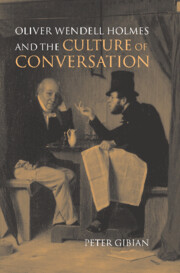Book contents
- Frontmatter
- Contents
- Acknowledgments
- Introduction
- PART ONE OPENING THE CONVERSATION
- PART TWO HOLMES IN THE CONVERSATION OF HIS CULTURE
- 2 “TO CHANGE THE ORDER OF CONVERSATION”: interruption and vocal diversity in Holmes' American talk
- 3 “COLLISIONS OF DISCOURSE” I: THE ELECTRODYNAMICS OF CONVERSATION A carnival of verbal fireworks
- 4 “COLLISIONS OF DISCOURSE” II: ELECTRIC AND OCEANIC “CURRENTS” IN CONVERSATION The cultural work of Holmesian talk
- 5 A CONVERSATIONAL APPROACH TO TRUTH: the Doctor in dialogue with contemporary truth-sayers
- 6 CONVERSATION AND “THERAPEUTIC NIHILISM”: the Doctor in dialogue with contemporary medicine
- 7 THE SELF IN CONVERSATION: the Doctor in dialogue with contemporary psychology
- PART THREE THE TWO POLES OF CONVERSATION
- PART FOUR CLOSING THE CONVERSATION
- Notes
- Index
6 - CONVERSATION AND “THERAPEUTIC NIHILISM”: the Doctor in dialogue with contemporary medicine
Published online by Cambridge University Press: 22 September 2009
- Frontmatter
- Contents
- Acknowledgments
- Introduction
- PART ONE OPENING THE CONVERSATION
- PART TWO HOLMES IN THE CONVERSATION OF HIS CULTURE
- 2 “TO CHANGE THE ORDER OF CONVERSATION”: interruption and vocal diversity in Holmes' American talk
- 3 “COLLISIONS OF DISCOURSE” I: THE ELECTRODYNAMICS OF CONVERSATION A carnival of verbal fireworks
- 4 “COLLISIONS OF DISCOURSE” II: ELECTRIC AND OCEANIC “CURRENTS” IN CONVERSATION The cultural work of Holmesian talk
- 5 A CONVERSATIONAL APPROACH TO TRUTH: the Doctor in dialogue with contemporary truth-sayers
- 6 CONVERSATION AND “THERAPEUTIC NIHILISM”: the Doctor in dialogue with contemporary medicine
- 7 THE SELF IN CONVERSATION: the Doctor in dialogue with contemporary psychology
- PART THREE THE TWO POLES OF CONVERSATION
- PART FOUR CLOSING THE CONVERSATION
- Notes
- Index
Summary
We are getting on towards the last part of this nineteenth century. What we have gained is not so much in positive knowledge … as it is in the freedom of discussion of every subject that comes within the range of observation and inference.
Holmes, The Poet at the Breakfast-Table“I know of no country in which there is so little independence of mind and real freedom of discussion as in America,” wrote Tocque-ville after his 1831–32 tour. And the Doctor might well have been spurred on by a very similar sociological diagnosis as he began experimenting with his first two “Autocrat” conversations in these same years. In such an environment, the “Brahmin” playground of “conversation” could be seen to have a truly “edifying” role, opening up the possibility of a sort of “town meeting of the mind” (to use Carl Bode's description of the era's Lyceum ideal), and thus serving not as the site for a last stand of defense against change, but rather as a site for change – and as a training ground for the emergence of the first forms of new ideas and of new languages.
THE FORM OF CHANGE: THE SAGE IN AN “AGE OF UNCERTAINTY”
Conversation often seems to be the verbal form most appropriate to a transitional period.
- Type
- Chapter
- Information
- Oliver Wendell Holmes and the Culture of Conversation , pp. 161 - 183Publisher: Cambridge University PressPrint publication year: 2001



